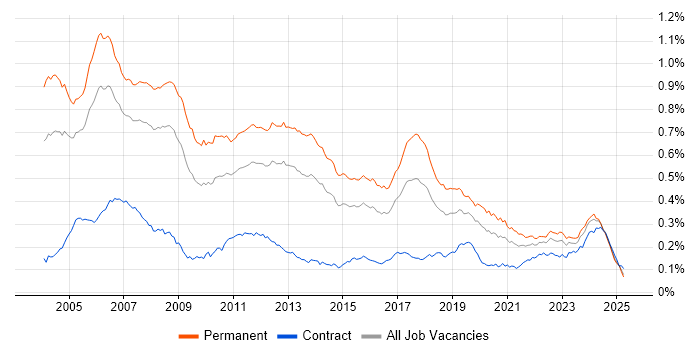Software Engineer - C++
UK
The median Software Engineer - C++ salary in the UK is £80,000 per year, according to job vacancies posted during the 6 months leading to 5 March 2026.
The table below compares current salary benchmarking and summary statistics with the previous two years.
| 6 months to 5 Mar 2026 |
Same period 2025 | Same period 2024 | |
|---|---|---|---|
| Rank | 503 | 590 | 583 |
| Rank change year-on-year | +87 | -7 | +124 |
| Permanent jobs requiring a C++ Software Engineer | 175 | 79 | 239 |
| As % of all permanent jobs in the UK | 0.24% | 0.17% | 0.30% |
| As % of the Job Titles category | 0.27% | 0.19% | 0.32% |
| Number of salaries quoted | 132 | 42 | 190 |
| 10th Percentile | £58,875 | £50,000 | £41,000 |
| 25th Percentile | £65,000 | £60,625 | £50,000 |
| Median annual salary (50th Percentile) | £80,000 | £72,500 | £60,000 |
| Median % change year-on-year | +10.34% | +20.83% | +4.35% |
| 75th Percentile | £100,000 | £95,000 | £70,000 |
| 90th Percentile | £110,750 | £111,250 | £82,500 |
| UK excluding London median annual salary | £70,000 | £70,000 | £60,000 |
| % change year-on-year | - | +16.67% | +9.09% |
All Permanent IT Job Roles
UK
For comparison with the information above, the following table provides summary statistics for all permanent IT job vacancies. Most job vacancies include a discernible job title that can be normalized. As such, the figures in the second row provide an indication of the number of permanent jobs in our overall sample.
| Permanent vacancies in the UK with a recognized job title | 65,777 | 41,647 | 74,342 |
| % of permanent jobs with a recognized job title | 91.60% | 91.11% | 94.66% |
| Number of salaries quoted | 41,594 | 22,804 | 57,442 |
| 10th Percentile | £29,750 | £32,500 | £28,500 |
| 25th Percentile | £38,250 | £45,000 | £39,073 |
| Median annual salary (50th Percentile) | £55,000 | £60,000 | £55,000 |
| Median % change year-on-year | -8.33% | +9.09% | -8.33% |
| 75th Percentile | £75,000 | £80,000 | £72,624 |
| 90th Percentile | £95,000 | £100,000 | £92,500 |
| UK excluding London median annual salary | £50,000 | £55,000 | £50,000 |
| % change year-on-year | -9.09% | +10.00% | -5.66% |
C++ Software Engineer
Job Vacancy Trend
Historical trend showing the proportion of permanent IT job postings featuring 'C++ Software Engineer' in the job title relative to all permanent IT jobs advertised.

C++ Software Engineer
Salary Trend
Salary distribution trend for C++ Software Engineer job vacancies in the UK.

C++ Software Engineer
Salary Histogram
Salary distribution for jobs citing C++ Software Engineer over the 6 months to 5 March 2026.
C++ Software Engineer
Top 14 Job Locations
The table below looks at the demand and provides a guide to the median salaries quoted in IT jobs citing C++ Software Engineer within the UK over the 6 months to 5 March 2026. The 'Rank Change' column provides an indication of the change in demand within each location based on the same 6 month period last year.
| Location | Rank Change on Same Period Last Year |
Matching Permanent IT Job Ads |
Median Salary Past 6 Months |
Median Salary % Change on Same Period Last Year |
Live Jobs |
|---|---|---|---|---|---|
| England | +111 | 172 | £80,000 | +10.34% | 48 |
| UK excluding London | +58 | 120 | £70,000 | - | 40 |
| South East | +17 | 61 | £70,000 | +7.69% | 18 |
| London | +74 | 53 | £100,000 | -4.76% | 10 |
| South West | 0 | 28 | £65,000 | - | 8 |
| Work from Home | +19 | 25 | £100,000 | +54.46% | 24 |
| East of England | +16 | 13 | £75,000 | +7.14% | 8 |
| Midlands | - | 9 | £53,750 | - | 4 |
| North of England | -22 | 8 | £45,000 | -30.77% | 1 |
| East Midlands | - | 7 | - | - | 2 |
| Yorkshire | - | 6 | £45,000 | - | |
| North West | -11 | 2 | £100,000 | +100.00% | 1 |
| West Midlands | - | 2 | £53,750 | - | 2 |
| Scotland | -13 | 1 | - | - | 1 |
C++ Software Engineer Skill Set
Top 30 Co-Occurring Skills & Capabilities
For the 6 months to 5 March 2026, C++ Software Engineer job roles required the following skills and capabilities in order of popularity. The figures indicate the absolute number of co-occurrences and as a proportion of all permanent job ads featuring C++ Software Engineer in the job title.
|
|
C++ Software Engineer Skill Set
Co-Occurring Skills & Capabilities by Category
The following tables expand on the one above by listing co-occurrences grouped by category. They cover the same employment type, locality and period, with up to 20 co-occurrences shown in each category:
|
|
||||||||||||||||||||||||||||||||||||||||||||||||||||||||||||||||||||||||||||||||||||||||||||||||||||||||||||||||||
|
|
||||||||||||||||||||||||||||||||||||||||||||||||||||||||||||||||||||||||||||||||||||||||||||||||||||||||||||||||||
|
|
||||||||||||||||||||||||||||||||||||||||||||||||||||||||||||||||||||||||||||||||||||||||||||||||||||||||||||||||||
|
|
||||||||||||||||||||||||||||||||||||||||||||||||||||||||||||||||||||||||||||||||||||||||||||||||||||||||||||||||||
|
|
||||||||||||||||||||||||||||||||||||||||||||||||||||||||||||||||||||||||||||||||||||||||||||||||||||||||||||||||||
|
|
||||||||||||||||||||||||||||||||||||||||||||||||||||||||||||||||||||||||||||||||||||||||||||||||||||||||||||||||||
|
|
||||||||||||||||||||||||||||||||||||||||||||||||||||||||||||||||||||||||||||||||||||||||||||||||||||||||||||||||||
|
|
||||||||||||||||||||||||||||||||||||||||||||||||||||||||||||||||||||||||||||||||||||||||||||||||||||||||||||||||||
|
|||||||||||||||||||||||||||||||||||||||||||||||||||||||||||||||||||||||||||||||||||||||||||||||||||||||||||||||||||
